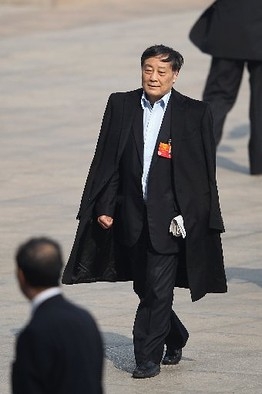
China's richest man has a strong statement for those looking to invest: 'The capital markets suck in China.'
对那些希望投资中国股市的人,中国首富宗庆后言辞激烈:中国资本市场糟透了。
Zong Qinghou climbed his way to the top of the list of China's wealthiest by amassing a fortune of $12.6 billion through his privately listed beverage empire Hangzhou Wahaha Group Co. On Tuesday, he made clear he didn't gain his wealth through the country's stock market.
通过其私人控制的饮料帝国杭州娃哈哈集团有限公司(Hangzhou Wahaha Group Co.),宗庆后积聚了126亿美元的财富,他也因此成为了中国首富。周二,宗庆后明确指出,他不是靠中国股市发家致富的。
'When the ordinary people invest in it, the market should reward them with some benefits. But it does not,' Mr. Zong said on the sidelines of China's annual parliamentary session, taking aim at speculators he says ruin the stock market for others. 'The speculation has totally cheated ordinary investors of any benefits.'
宗庆后在参加全国人大会议间隙对记者说,老百姓投资股市,市场应该给他们一些回报,但实际情况不是这样。宗庆后此言直指股市投机者。在他看来,这些人毁了股市,让其他股民赚不到钱。他说,投机令普通投资者没有赚到任何收益。
The sentiment of the billionaire, who is also an NPC representative, speaks volumes about the state of the country's capital markets, highlighting the monumental obstacles investors face in China as they look for places to park their money in hopes of a return.
身为全国人大代表,宗庆后这位亿万富豪的情绪化言论道出了中国资本市场的现状,凸显了投资者在中国面临的巨大障碍。眼下,投资者正在为自己的资金寻找投资渠道,希望获得投资收益。
In recent years, China's stock markets have lagged and generally been sluggish, plagued by too many offerings and a slowing Chinese economy. China's stock bubble burst at the end of 2007 after the benchmark Shanghai Composite Index rose to almost 6,000 points from about 1,000 two years earlier. But the market has never recovered from its collapse, loitering around 2,000 points ever since.
近年来,中国股市发展滞后,整体而言缺乏活力,主要受新股发行数量过多以及中国经济增速放缓拖累。中国股市泡沫在2007年末破灭。泡沫破灭前基准指数上证综指从05年的大约1,000点涨至近6,000点。但中国股市却从未从这次崩盘中恢复过来,自那以后大盘始终在2,000点左右徘徊。
The retail investors that fueled the bubble in the first place remain scarred by the experience, and have mostly stayed away. A common complaint is that the only investors who make money from China's stock markets are those with inside information.
在一开始帮助吹大泡沫的散户投资者仍然对此心有余悸,大多数人已经退出股市。一种常见的抱怨是,在中国股市,只有掌握内幕消息的人才能赚钱。
The Chinese government has made efforts to restore confidence, in part by trying to crack down on insider trading. And China Securities Regulatory Commission Chairman Guo Shuqing has floated the idea of bringing China's model closer to that of the West, reducing the role the government plays in approving initial public offerings and shifting more power to auditors and investment banks, to foster a more transparent market where the various players take greater responsibility for their actions.
中国政府已付出多种努力以恢复市场信心,其中之一就是试图打击内幕交易。中国证监会主席郭树清已经提出一种理念,即让中国股市的发展模式向西方靠拢,降低政府在审批首次公开募股中发挥的作用,把更多权力转移给审计师和投资银行,以促进更加透明的市场的形成。在这样的市场中,参与各方都要为自己的行为承担更大的责任。
Still, Mr. Guo first raised those ideas over a year ago and little change in that direction has happened since.
尽管如此,郭树清第一次提出这些想法还是在一年多以前,但是此后,在这方面几乎没有出现任何改变。
Mr. Zong, a classic rags-to-riches story, is considered one of China's savviest entrepreneurs, having built Wahaha from the ground up after taking over a grocery store in 1987.
白手起家的宗庆后被认为是中国最精明的企业家之一。1987年,他在接管了一家杂货店之后创办了哇哈哈集团。
Wahaha saw a 6% profit margin on sales of its bottled water, teas and outfits from its clothing line reach 68 billion yuan ($10.8 billion) in 2011, up 24% from a year earlier, according to the most recent figures available from a spokesman. In the past year, the 69-year-old chain smoker has expanded his empire by opening a luxury shopping mall in Hangzhou, a Chinese city south of Shanghai.
根据一名发言人提供的最新数据,2011年,哇哈哈集团的瓶装水、茶饮料以及服装业务的利润率为6%,销售额为人民币680亿元(合108亿美元),同比增长了24%。过去的一年,这位烟不离手的69岁老人在上海南边的杭州市开设了一家豪华购物中心,扩大了他的帝国。
Mr. Zong has stated time and again that he's hunting for deals overseas but that the outlook in North America and Europe remains gloomy. The tycoon says he'd rather attract partners to China at this point, where consumers seem poised to spend more and therefore boost demand.
宗庆后多次表示,他正在寻找海外交易,但是北美和欧洲的前景仍然不容乐观。这位大亨说,目前他宁可把合作伙伴吸引到中国,因为中国的消费者似乎准备花更多钱,从而提振了需求。
So rather than investing in the stock market, Mr. Zong is now looking to park money in high-tech projects. 'We are looking for opportunities and will invest in anywhere that needs us in fields including bioengineering and energy-saving electrical appliance etc.,' said Zong.
因此,宗庆后现在寻求投资高科技项目,而不是股市。宗庆后说,我们现在正在寻找机会,我们将在任何需要我们的地方进行投资,包括生物工程和节能家电等领域。
Mr. Zong also waded into the country's frothy debate over urbanization, urging the government to curb the expansion of large cities. 'Some social problems are caused by excessive development of large cities, including healthcare issues,' said Mr. Zong. ' So it is better for urbanization to focus on developing small-and-median-size cities.'
宗庆后还参与了中国对城镇化的泛泛讨论,要求政府限制大城市的扩张。宗庆后说,一些社会问题就是大城市的过度发展造成的,包括医保问题。因此,城镇化最好关注中小型城市的发展。
The drinks magnate is one an increasing number of wealthy entrepreneurs who've found themselves on the list of NPC delegates in recent years a phenomenon he thinks is only natural. 'China's economy is developing so rapidly, so there will be more rich people,' said Mr. Zong. ' As we are people's representatives, of course we can represent the people well.'
这位饮料业巨头是最近几年成为人大代表的富有企业家之一,最近几年,这样的人大代表数量逐渐增多,宗庆后认为这很正常。宗庆后说,中国经济正在迅速发展,富人会越来越多。既然我们是人民的代表,我们当然可以很好地代表人民。












